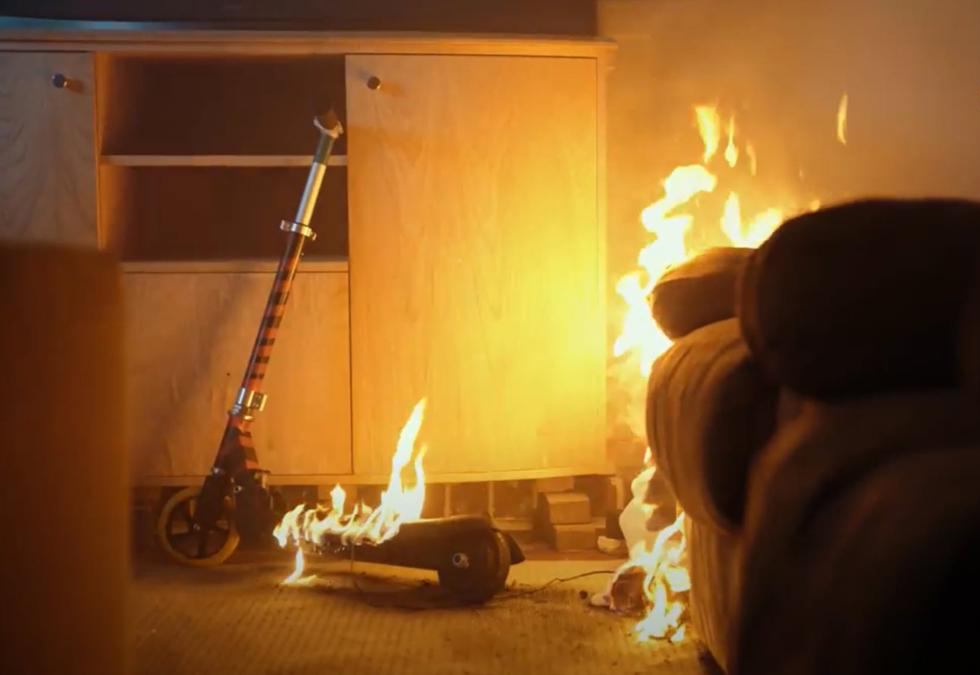In recent years, the popularity of e-scooters and e-bikes has surged, offering a convenient and eco-friendly alternative to traditional transport. However, as their use increases, so does the Fire Risks of Lithium-Ion Batteries, associated with the equipment. At Prevention 1st, we prioritise fire safety, and it is crucial to understand the dangers posed by these batteries and the preventative measures that can be taken to reduce fire risks.
The Fire Risks of Lithium-Ion Batteries
Lithium-ion batteries, found in e-scooters, e-bikes, and other rechargeable devices, can pose significant fire hazards if not handled correctly. The risks include:
- Thermal Runaway: A chemical reaction within the battery that generates excessive heat, potentially leading to fire or explosion.
- Overcharging & Poor Charging Practices: Using non-certified chargers or leaving devices charging for extended periods increases the risk of overheating.
- Physical Damage: Dropped or damaged batteries can short-circuit, increasing the likelihood of a fire.
- Manufacturing Defects: Poorly made or counterfeit batteries are more prone to failure.
- Improper Storage: Exposing batteries to extreme temperatures can compromise their safety and performance.

Fire Prevention Strategies for Lithium Batteries
To minimize the fire hazards associated with lithium-ion batteries, Prevention 1st recommends the following fire safety best practices:
- Use Manufacturer-Approved Chargers
- Always use the charger supplied by the manufacturer or one that meets the correct specifications to avoid overcharging and overheating.
- Charge in a Safe Environment
- Charge e-scooters and e-bikes away from flammable materials and never leave them unattended while charging.
- Avoid charging overnight, as fires often occur when no one is present to intervene.
- Regular Battery Inspections
- Check batteries for signs of swelling, leakage, or unusual heating.
- Discontinue use if any abnormalities are detected and consult a professional for replacement.
- Proper Storage Practices
- Store batteries in a cool, dry place, away from direct sunlight or extreme temperatures.
- Never leave batteries in damp environments, as moisture can cause short circuits.
- Dispose of Batteries Responsibly
- Never throw lithium-ion batteries in household waste; instead, use designated recycling points.
- Follow local regulations for battery disposal to prevent environmental hazards.
- Install Fire Protection Systems
- Ensure that your home or business has fire safety measures in place, including smoke detectors and fire extinguishers.
- Prevention 1st offers fire risk assessments to help identify potential fire hazards and improve overall safety.
What to Do in Case of a Lithium-Ion Battery Fire
If a lithium-ion battery fire occurs:
- Do not use water as lithium fires can react with water, causing further hazards.
- Use a Class D fire extinguisher, specifically designed for lithium battery fires.
- Evacuate immediately and call emergency services.
Enhancing the safety of lithium-ion batteries in e-scooters and e-bikes is a critical concern. For further insights and safety guidelines, consider the following resources:
- National Fire Protection Association (NFPA): Offers comprehensive information on the risks associated with lithium-ion batteries in e-bikes and e-scooters, along with safety recommendations. https://www.nfpa.org/education-and-research/electrical/ebikes
- London Fire Brigade's #ChargeSafe Campaign: Highlights the increasing incidents of fires related to e-bikes and e-scooters in London and provides practical safety tips to mitigate risks. https://www.london-fire.gov.uk/safety/lithium-batteries/the-dangers-of-electric-scooter-and-electric-bicycle-batteries
By consulting these resources, individuals and businesses can gain a deeper understanding of the potential risks associated with lithium-ion batteries in e-mobility devices and adopt effective measures to enhance safety.
Stay Safe with Prevention 1st
At Prevention 1st, we are committed to fire safety and risk prevention. Our fire risk assessments, fire safety training, and consultancy services help individuals and businesses reduce fire hazards related to lithium-ion batteries. Contact us today for expert advice on fire safety and ensuring your premises are protected from the dangers of battery fires.
For more fire safety tips and expert guidance, visit our website at Prevention 1st.
